Dec 18, 2015 | Non categorizzato
This year, the usual appointment promoted by the youth of the Focolare and aims to involve the greatest number of people and institutions in their journey towards fraternity, will be cantered in Quito, Ecuador. The theme of inculturality, with a manifestation of the youth at the so-called “Other half of the world,” where one can enter with one foot in the boreal hemisphere and the other in the austral hemisphere. There will be days of dialogue among young people of different cultures, through work sessions, sharing and community tourism in a setting of exuberant nature. Complete information on the Ecuador programme is given on the site, www.munodunido2016.com. “Link Cultures – un camino para la paz” is the title that expresses the core of all the fraternity initiatives that will ensure simultaneously throughout the world, uniting generations and cultures in a unique workshop and can be traced through the hashtag #4peace. Run4Unity – Another novelty this year is the involvement of the kids: the wold sports event, Run4Unity, the world relay race for peace which in the previous editions saw the participation of thousands of teens, which will be held annually from now on, and will be inserted in the United World Week. The La Run4Unity 2016 will take place next 8 May. The Youth for a United World hope that this on-the-road International Expo, now running on its 20th anniversary be also recognised by the UN. The initiatives that come about during the year, and on which the United World Week focuses its spotlight, are all part of the United World Project.
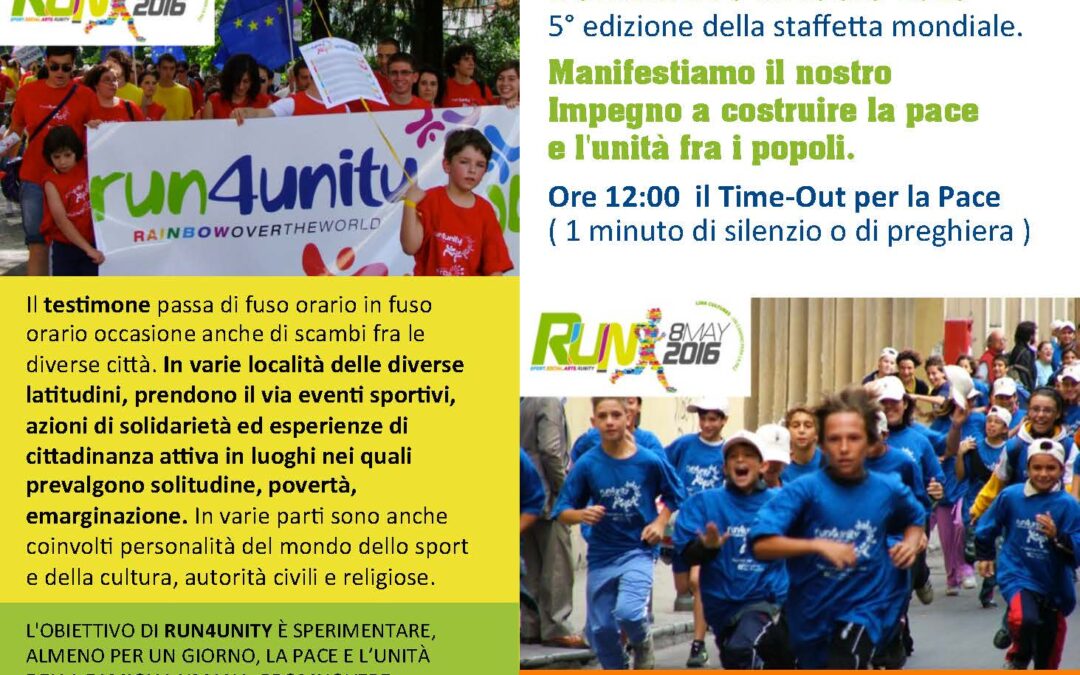
Dec 18, 2015 | Non categorizzato
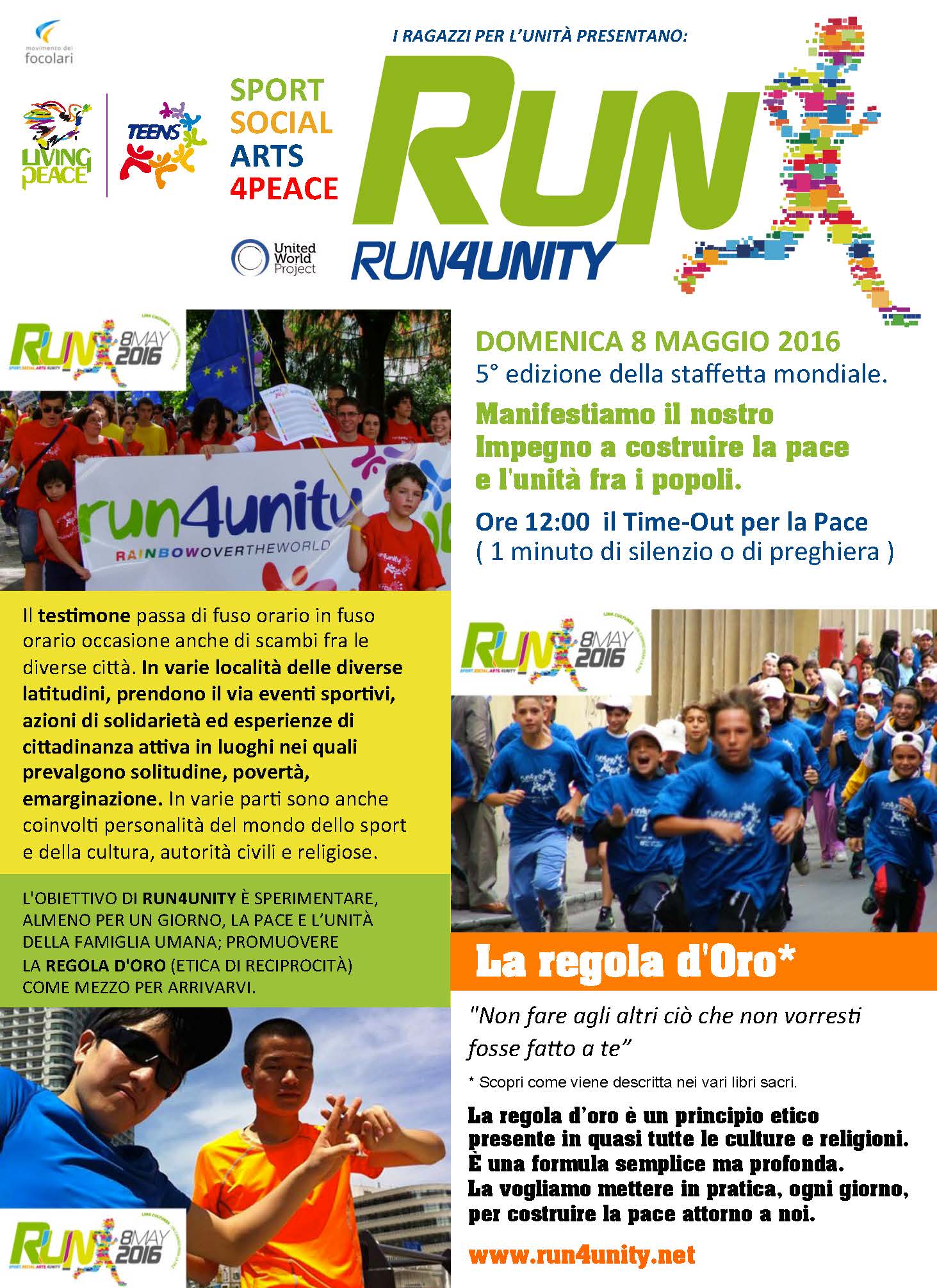 From 11 am to 12 noon in all the time zones, children throughout the world will run for peace (a stretch of the itinerary will be done on foot or by bike, roller skates, and canoe) with an extraordinary passing of the baton, from the cities situated in a preceding time zone to another. How? Through a phone call, or text message or at least “ideally linking up” with the others. 12 noon is the Time-Out, a minute of silence or prayer for peace. The day on which the Run4unity will be held will be called “World Day of the Golden Rule”: upon putting it into practice and promoting it, we will silently but effectively build Peace and a more united world. The web site http://www.run4unity.net is the tool which will highlight the world demonstration, in continual connection with social media, to allow all the boys and girls to be active in building and spreading the Event. There have been four international editions of this project: in 2005, 2008, 2012 and 2015. The R4U event is really quite unique since it links kids throughout the world, and who in a time span of 24 hours, from one time zone to the other, undertake to achieve a sole objective: unity of the human family. This explains the great interest of the mass media, and civil, religious and political authorities. Run4Unity is part of the activities of the United World Week and United World Project. Info: http://www.run4unity.net/ https://www.youtube.com/watch?v=SYR8R-_Rg_M
From 11 am to 12 noon in all the time zones, children throughout the world will run for peace (a stretch of the itinerary will be done on foot or by bike, roller skates, and canoe) with an extraordinary passing of the baton, from the cities situated in a preceding time zone to another. How? Through a phone call, or text message or at least “ideally linking up” with the others. 12 noon is the Time-Out, a minute of silence or prayer for peace. The day on which the Run4unity will be held will be called “World Day of the Golden Rule”: upon putting it into practice and promoting it, we will silently but effectively build Peace and a more united world. The web site http://www.run4unity.net is the tool which will highlight the world demonstration, in continual connection with social media, to allow all the boys and girls to be active in building and spreading the Event. There have been four international editions of this project: in 2005, 2008, 2012 and 2015. The R4U event is really quite unique since it links kids throughout the world, and who in a time span of 24 hours, from one time zone to the other, undertake to achieve a sole objective: unity of the human family. This explains the great interest of the mass media, and civil, religious and political authorities. Run4Unity is part of the activities of the United World Week and United World Project. Info: http://www.run4unity.net/ https://www.youtube.com/watch?v=SYR8R-_Rg_M
Dec 18, 2015 | Non categorizzato
“Unity”, the basic point of the spirituality of the Focolare Movement, will be deepened during this meeting, with experiences of people from various cities, where the spirituality lived by many has affected the life of those regions. This is the case of the community of Szeged, Hungary, or Loppiano, in Valdarno, Tuscany and again on ecumenism in Great Britain, and the social field in Brazil. One of the many themes to be discussed is the aspect of communications as a tool used to reach unity; dialogue especially in the ecumenical and interreligious field, and the Focolare Movement’s commitment for peace. The great majority of those participating will be from Italy but also from France, Hungary, Greece and England. For information and bookings: info@focolare.org www.centromariapoli.org
Dec 18, 2015 | Non categorizzato
«Unity» the basic point of the spirituality of the Focolare Movement, will be deepened during this meeting, with experiences of people from various cities, where the spirituality lived by many has affected the life of those regions. This is the case of the community of Szeged, Hungary, or Loppiano, in Valdarno, Tuscany and again on ecumenism in Great Britain, and the social field in Brazil. One of the many themes to be discussed is the aspect of communications as a tool used to reach unity; dialogue especially in the ecumenical and interreligious field, and the Focolare Movement’s commitment for peace. The great majority of those participating will be from Italy but also from France, Hungary, Greece and England. Another congress on the same themes will be held from 3- 5 March. Info: info@focolare.org www.centromariapoli.org
Dec 18, 2015 | Non categorizzato
About 60 Bishops from all over the word will meet in Castel Gandolfo to go deeper in mutual communion, and share and reflect on the theme of «unity,» the element which is central to the charism of the Focolare. For those who are interested, the program will continue up to the 28th with a visit to the international town of Loppiano.
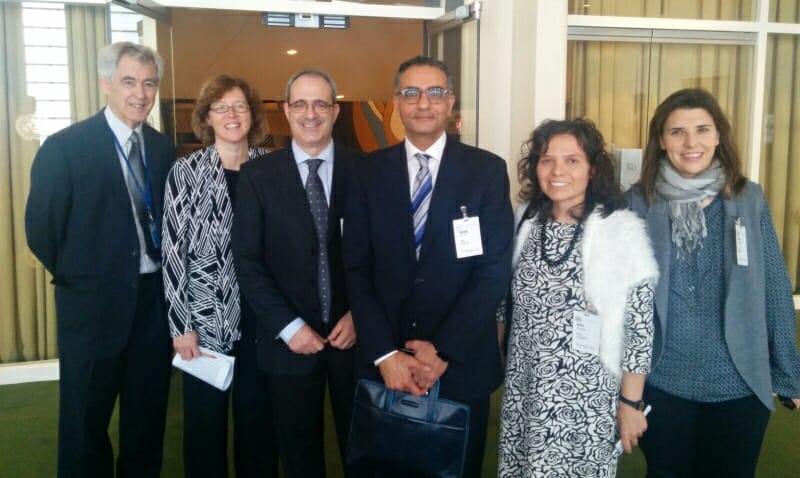
Dec 18, 2015 | Focolare Worldwide
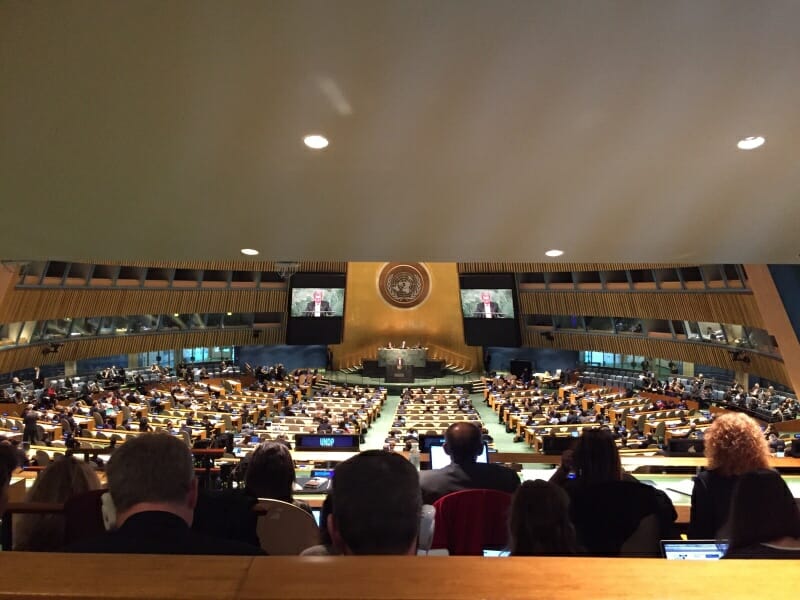
A working session during the conference

With Mr Fadi Chehade, President of ICANN (centre), a non profit organisation which administers the assignation of top level domains on the Internet.
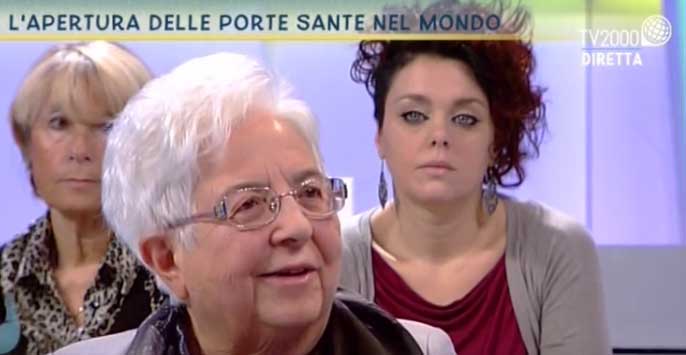
Dec 17, 2015 | Non categorizzato
 “Bel tempo si spera”, [Hoping for good times] is a programme broadcast by the Catholic Television Company TV2000. The programme on 14th December focused on subjects concerning the Jubilee, taking the viewers on a journey to several Cathedrals in the world, on the day after the opening of their Holy Doors. Maria Voce was in the studio, at the invitation of the presenter Lucia Ascione. Between one stage and another of this symbolic tour a dialogue took place on various subjects, starting with the meaning of the Jubilee. Maria Voce said, “The Year of Mercy gives us new courage to believe that God is Love. Now, when it seems that everything has become relative, we need to go back to what really matters, to believe in Love”. Later on, she added: “Unfortunately, modern culture speaks of anger, revenge, rights that have been trampled on, things that lead to sadness and despondency. We want to bring trust, forgiveness and mutual love. We want to look at the world as one family, the family of God’s children. And God is mercy, God is love.” “I like to recall – she went on – that the Pope did not open “the” Holy Door” but many holy doors. Pope Francis has said even the door of a prison cell can be a Holy Door. The door is a sign of the merciful love of the Father who is waiting for us all to come home, no-one excluded.” Lucia Ascione referred to Pope Francis’ words at the Angelus the previous day concerning the Focolare’s dialogue with Muslims. Maria Voce affirmed, “This harmonious encounter between people of different faiths that we experience did not happen yesterday, but has been built up day by day, over the years and in many places, through friendships; respecting difference.” Ascione insisted: “If it is so simple for you, why is it so hard for the world?” Maria Voce: “The Pope has said that unfortunately there is much self-interest. Instead we need to learn how to go beyond ourselves and be ready to welcome others, even if they are different. It is a love that we learn by loving, going towards others. Certainly, differences can make us fearful, that is true for everyone. It is a fear that can only be overcome with love. Taking up arms is of no use.” The presenter asked “You went to the United Nations and spoke there. What did you say to them? “I said that we need to convert ourselves, but not superficially. I said we must not see dialogue as one of many ways but as the only real way forward. It is difficult to accept this viewpoint because the “scandal of the cross” has not been understood. Mercy makes us do the part that the other should do, as Jesus did who died for each one of us.” Maria Voce explained “It is the experience that we have on a daily basis with those who knock on our doors. Recently 170 unaccompanied minors stayed in our little town in Holland and were made welcome”. Recalling the words of the press release that Maria Voce had issued after the Paris attacks, Ms Ascione asked: “What did you mean when you said we should ask ourselves whether everything that could have been done to avoid such violent reactions had been done?” “Very often we are affected by things that happen nearby, forgetting those that happen in other places where the horror of war is lived every day. We have communities in those places and we know that it is still possible to build something positive. We have doctors who don’t check to see whether a wounded person is a Christian or a Muslim; people who make their wells available to others when water is scarce, regardless of the religion they practice. Maybe we don’t know how to ask ourselves the right questions. That is why we questioned ourselves first of all. Perhaps we did not follow through with these things in the past. Being able to make an examination of conscience can open us up to hope. Seeing those who suffer, who are poor, we must not be afraid to open our hearts. We must not be afraid to empty our pockets and our wallets, to live simply and with respect for creation, seeing other people as brothers and sisters, part of the same family.”
“Bel tempo si spera”, [Hoping for good times] is a programme broadcast by the Catholic Television Company TV2000. The programme on 14th December focused on subjects concerning the Jubilee, taking the viewers on a journey to several Cathedrals in the world, on the day after the opening of their Holy Doors. Maria Voce was in the studio, at the invitation of the presenter Lucia Ascione. Between one stage and another of this symbolic tour a dialogue took place on various subjects, starting with the meaning of the Jubilee. Maria Voce said, “The Year of Mercy gives us new courage to believe that God is Love. Now, when it seems that everything has become relative, we need to go back to what really matters, to believe in Love”. Later on, she added: “Unfortunately, modern culture speaks of anger, revenge, rights that have been trampled on, things that lead to sadness and despondency. We want to bring trust, forgiveness and mutual love. We want to look at the world as one family, the family of God’s children. And God is mercy, God is love.” “I like to recall – she went on – that the Pope did not open “the” Holy Door” but many holy doors. Pope Francis has said even the door of a prison cell can be a Holy Door. The door is a sign of the merciful love of the Father who is waiting for us all to come home, no-one excluded.” Lucia Ascione referred to Pope Francis’ words at the Angelus the previous day concerning the Focolare’s dialogue with Muslims. Maria Voce affirmed, “This harmonious encounter between people of different faiths that we experience did not happen yesterday, but has been built up day by day, over the years and in many places, through friendships; respecting difference.” Ascione insisted: “If it is so simple for you, why is it so hard for the world?” Maria Voce: “The Pope has said that unfortunately there is much self-interest. Instead we need to learn how to go beyond ourselves and be ready to welcome others, even if they are different. It is a love that we learn by loving, going towards others. Certainly, differences can make us fearful, that is true for everyone. It is a fear that can only be overcome with love. Taking up arms is of no use.” The presenter asked “You went to the United Nations and spoke there. What did you say to them? “I said that we need to convert ourselves, but not superficially. I said we must not see dialogue as one of many ways but as the only real way forward. It is difficult to accept this viewpoint because the “scandal of the cross” has not been understood. Mercy makes us do the part that the other should do, as Jesus did who died for each one of us.” Maria Voce explained “It is the experience that we have on a daily basis with those who knock on our doors. Recently 170 unaccompanied minors stayed in our little town in Holland and were made welcome”. Recalling the words of the press release that Maria Voce had issued after the Paris attacks, Ms Ascione asked: “What did you mean when you said we should ask ourselves whether everything that could have been done to avoid such violent reactions had been done?” “Very often we are affected by things that happen nearby, forgetting those that happen in other places where the horror of war is lived every day. We have communities in those places and we know that it is still possible to build something positive. We have doctors who don’t check to see whether a wounded person is a Christian or a Muslim; people who make their wells available to others when water is scarce, regardless of the religion they practice. Maybe we don’t know how to ask ourselves the right questions. That is why we questioned ourselves first of all. Perhaps we did not follow through with these things in the past. Being able to make an examination of conscience can open us up to hope. Seeing those who suffer, who are poor, we must not be afraid to open our hearts. We must not be afraid to empty our pockets and our wallets, to live simply and with respect for creation, seeing other people as brothers and sisters, part of the same family.”
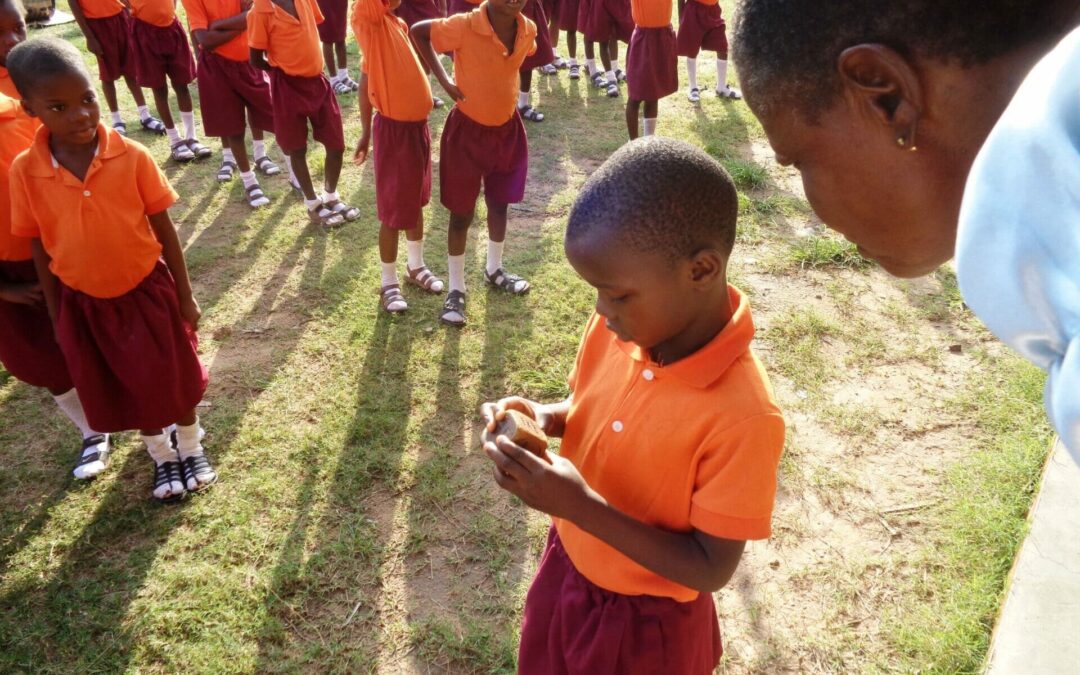
Dec 16, 2015 | Focolare Worldwide, Senza categoria
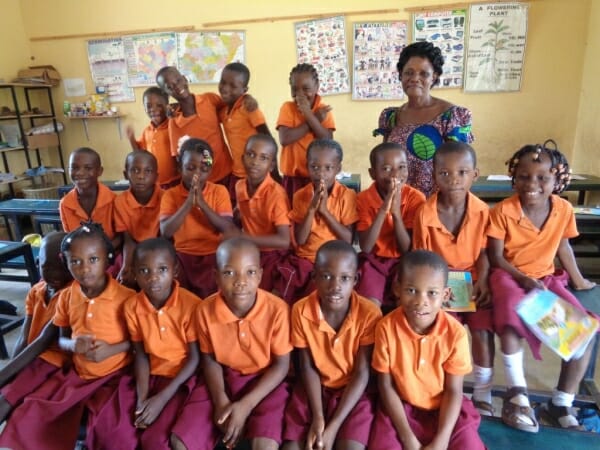 Education is one of the most important challenges the Nigerian schooling system has to face, and where at times Nigerian society has to deal with aggressive behavior and religious traditions that imbue fear and a sense of helplessness in the face of evil. “One day,” Christiane recounts, ” a mother stopped bringing her daughter to school because we had asked the parents to cut the hair of the children who were about to start the first year of nursery school. She said that someone who was believed to be in contact with spirits had told her that her daughter would die if she cut her hair. And this explained why the child no longer went to school.” Christiane who is of German origin, had worked for many years in the youth section of the Focolare. Through support from a distance project of the New Families association, today she still works with children in Igbariam, a village 40 km away from Onithsa city, south-east of Nigeria, and where the “Fraternity School” is established. The project started in 1995 as a result of the efforts of a group of the Focolare, which started in the 1980s a human promotion process to offer concrete development opportunities through deep relationships with the local people and respect for local traditions. “Through concrete acts of love for some children, an after-school club was formed, which later, slowly turned into a nursery and then an elementary school. Starting from the nursery school, the endeavour is to give the children a global education, preparing them to face the many challenges of this great nation.” Instituted in 2006, today the school counts 223 students, with 75 in the nursery and 148 in the primary school. With time, also the parents became involved in an educational and social project which avails of an educational method based on human values, a teaching style that believes in and respects the dignity of the child as a person. Attention is paid particularly to the smaller ones, just as the Gospel says, offering new tools for global human growth. For example, the “dice of love” is used, with which students and teachers live their daily commitment to peace and solidarity.
Education is one of the most important challenges the Nigerian schooling system has to face, and where at times Nigerian society has to deal with aggressive behavior and religious traditions that imbue fear and a sense of helplessness in the face of evil. “One day,” Christiane recounts, ” a mother stopped bringing her daughter to school because we had asked the parents to cut the hair of the children who were about to start the first year of nursery school. She said that someone who was believed to be in contact with spirits had told her that her daughter would die if she cut her hair. And this explained why the child no longer went to school.” Christiane who is of German origin, had worked for many years in the youth section of the Focolare. Through support from a distance project of the New Families association, today she still works with children in Igbariam, a village 40 km away from Onithsa city, south-east of Nigeria, and where the “Fraternity School” is established. The project started in 1995 as a result of the efforts of a group of the Focolare, which started in the 1980s a human promotion process to offer concrete development opportunities through deep relationships with the local people and respect for local traditions. “Through concrete acts of love for some children, an after-school club was formed, which later, slowly turned into a nursery and then an elementary school. Starting from the nursery school, the endeavour is to give the children a global education, preparing them to face the many challenges of this great nation.” Instituted in 2006, today the school counts 223 students, with 75 in the nursery and 148 in the primary school. With time, also the parents became involved in an educational and social project which avails of an educational method based on human values, a teaching style that believes in and respects the dignity of the child as a person. Attention is paid particularly to the smaller ones, just as the Gospel says, offering new tools for global human growth. For example, the “dice of love” is used, with which students and teachers live their daily commitment to peace and solidarity. 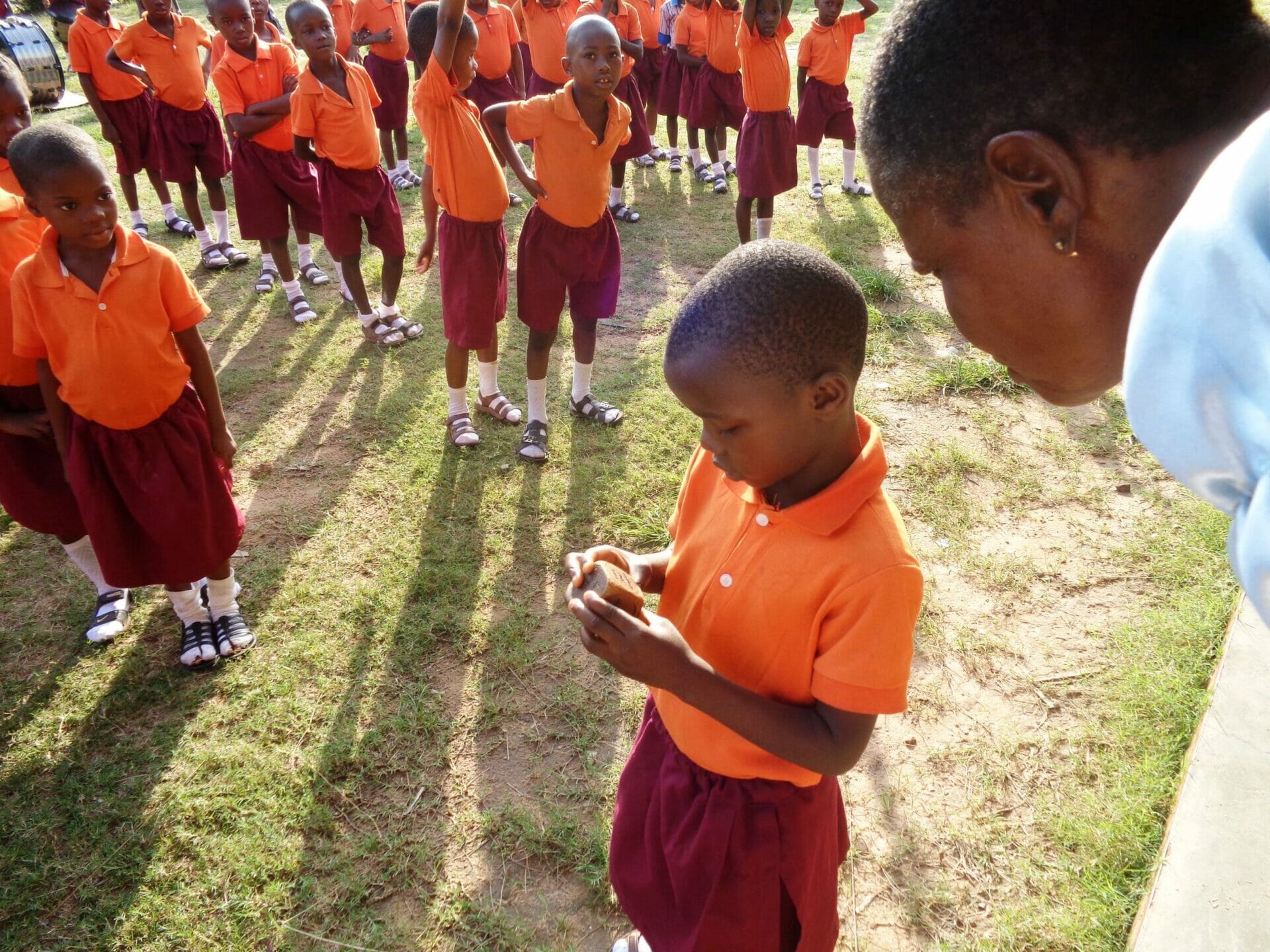 It is also a novelty since in many Nigerian schools, physical punishment is considered a necessary practice in the educational process. The idea in force is “Spare the rod and spoil the child,” and it is not easy to change this mentality. However, in an interview with the newly instituted “New City Nigeria,” Mrs. Akwobi of the Nwafor Orizu College of Education Nsugbe, affirmed that “current psychological studies have demonstrated that the negative effects of these corrective measures surpass the positive ones and that the children often become tense and aggressive with physical punishments. They are unable to empathise with the teachers and transfer this rejection to the subjects they teach.” Mrs Akwobi went on to say: “Instead, it is important that they are able to develop awareness in choosing the good and not only to avoid punishment. The teacher should behave as one who always has something to learn, because teaching is a two-way process. Listening to others, patience, and comprehension have a positive effect on the children and their learning abilities. Furthermore, adopting nonviolent measures in school relationships helps to also reduce the rate of violence in society. These educational principles are being implemented in the Fraternity School in Nigeria.” Christiane concluded by saying: “Here, many people leave to look for a better life in Europe. Our job aims at helping people to build a liveable experience in their own countries. Thank you for whatever help you can give! You cannot imagine how much it is helping us to proceed with social works, spread a new culture, and contribute to the development of this country based on Christian love.” Solidarity at a distance: http://www.afnonlus.org/
It is also a novelty since in many Nigerian schools, physical punishment is considered a necessary practice in the educational process. The idea in force is “Spare the rod and spoil the child,” and it is not easy to change this mentality. However, in an interview with the newly instituted “New City Nigeria,” Mrs. Akwobi of the Nwafor Orizu College of Education Nsugbe, affirmed that “current psychological studies have demonstrated that the negative effects of these corrective measures surpass the positive ones and that the children often become tense and aggressive with physical punishments. They are unable to empathise with the teachers and transfer this rejection to the subjects they teach.” Mrs Akwobi went on to say: “Instead, it is important that they are able to develop awareness in choosing the good and not only to avoid punishment. The teacher should behave as one who always has something to learn, because teaching is a two-way process. Listening to others, patience, and comprehension have a positive effect on the children and their learning abilities. Furthermore, adopting nonviolent measures in school relationships helps to also reduce the rate of violence in society. These educational principles are being implemented in the Fraternity School in Nigeria.” Christiane concluded by saying: “Here, many people leave to look for a better life in Europe. Our job aims at helping people to build a liveable experience in their own countries. Thank you for whatever help you can give! You cannot imagine how much it is helping us to proceed with social works, spread a new culture, and contribute to the development of this country based on Christian love.” Solidarity at a distance: http://www.afnonlus.org/
Dec 15, 2015 | Non categorizzato
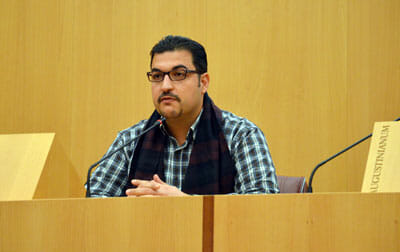
Dec 14, 2015 | Focolare Worldwide
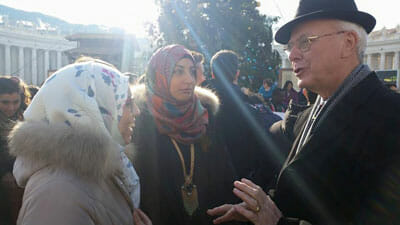 “Carry on! Carry on with courage along the road of dialogue and brotherhood, because we are all children of God!” Pope Francis forcefully told the hundred people from the Focolare and several Italian Muslim communities at the end of the December 13th Angelus. They had come together to testify to their common journey that has been underway for many years, “Christians and Muslims Together in Building Peace,” as the banner they held read on Saint Peter’s Square. There were imams with their communities from Rome, Trieste, Teramo, and Catania, young women and teenagers from the Mosque of Centocelle in Rome, families and children, scholars and journalists. There was also a delegation from the Buddhist, Risho Kosei Kai Movement, and representatives from Religions for Peace and from other religions. From the festive atmosphere on Saint Peter’s Square, the group of 400 people moved to the seat of the Augustinianum which is just a few hundred metres from the colonnade surrounding Saint Peter’s Square. The lunch they shared provided a setting for some jovial interaction that everyone was looking forward to; there was a prayer room for Muslims; Mass for Catholics – such an unusual event that it was widely covered in the press.
“Carry on! Carry on with courage along the road of dialogue and brotherhood, because we are all children of God!” Pope Francis forcefully told the hundred people from the Focolare and several Italian Muslim communities at the end of the December 13th Angelus. They had come together to testify to their common journey that has been underway for many years, “Christians and Muslims Together in Building Peace,” as the banner they held read on Saint Peter’s Square. There were imams with their communities from Rome, Trieste, Teramo, and Catania, young women and teenagers from the Mosque of Centocelle in Rome, families and children, scholars and journalists. There was also a delegation from the Buddhist, Risho Kosei Kai Movement, and representatives from Religions for Peace and from other religions. From the festive atmosphere on Saint Peter’s Square, the group of 400 people moved to the seat of the Augustinianum which is just a few hundred metres from the colonnade surrounding Saint Peter’s Square. The lunch they shared provided a setting for some jovial interaction that everyone was looking forward to; there was a prayer room for Muslims; Mass for Catholics – such an unusual event that it was widely covered in the press.
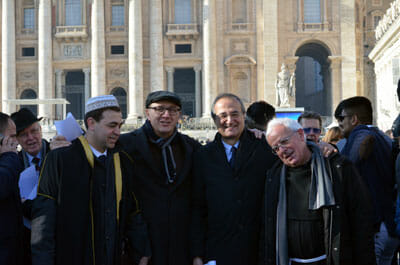
From left: Imam Maher Akkad, Antonio Olivero, Michele Zanzucchi, father Egidio Canil

Amjad Zedan, a Syrian student from Sophia University Institute








 It is also a novelty since in many Nigerian schools, physical punishment is considered a necessary practice in the educational process. The idea in force is “Spare the rod and spoil the child,” and it is not easy to change this mentality. However, in an interview with the newly instituted “New City Nigeria,” Mrs. Akwobi of the Nwafor Orizu College of Education Nsugbe, affirmed that “current psychological studies have demonstrated that the negative effects of these corrective measures surpass the positive ones and that the children often become tense and aggressive with physical punishments. They are unable to empathise with the teachers and transfer this rejection to the subjects they teach.” Mrs Akwobi went on to say: “Instead, it is important that they are able to develop awareness in choosing the good and not only to avoid punishment. The teacher should behave as one who always has something to learn, because teaching is a two-way process. Listening to others, patience, and comprehension have a positive effect on the children and their learning abilities. Furthermore, adopting nonviolent measures in school relationships helps to also reduce the rate of violence in society. These educational principles are being implemented in the Fraternity School in Nigeria.” Christiane concluded by saying: “Here, many people leave to look for a better life in Europe. Our job aims at helping people to build a liveable experience in their own countries. Thank you for whatever help you can give! You cannot imagine how much it is helping us to proceed with social works, spread a new culture, and contribute to the development of this country based on Christian love.” Solidarity at a distance:
It is also a novelty since in many Nigerian schools, physical punishment is considered a necessary practice in the educational process. The idea in force is “Spare the rod and spoil the child,” and it is not easy to change this mentality. However, in an interview with the newly instituted “New City Nigeria,” Mrs. Akwobi of the Nwafor Orizu College of Education Nsugbe, affirmed that “current psychological studies have demonstrated that the negative effects of these corrective measures surpass the positive ones and that the children often become tense and aggressive with physical punishments. They are unable to empathise with the teachers and transfer this rejection to the subjects they teach.” Mrs Akwobi went on to say: “Instead, it is important that they are able to develop awareness in choosing the good and not only to avoid punishment. The teacher should behave as one who always has something to learn, because teaching is a two-way process. Listening to others, patience, and comprehension have a positive effect on the children and their learning abilities. Furthermore, adopting nonviolent measures in school relationships helps to also reduce the rate of violence in society. These educational principles are being implemented in the Fraternity School in Nigeria.” Christiane concluded by saying: “Here, many people leave to look for a better life in Europe. Our job aims at helping people to build a liveable experience in their own countries. Thank you for whatever help you can give! You cannot imagine how much it is helping us to proceed with social works, spread a new culture, and contribute to the development of this country based on Christian love.” Solidarity at a distance: 

